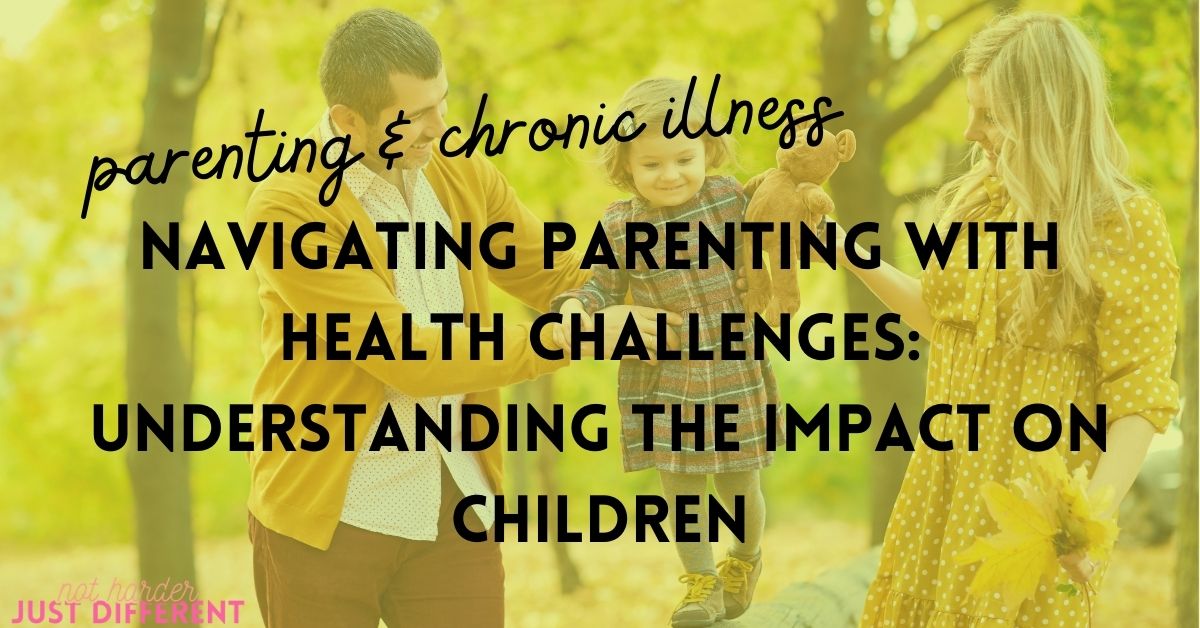Disclaimer: As a future Licensed Clinical Social Worker (LCSW) currently pursuing my master’s degree, I am passionate about sharing insights and information related to parenting, autism and homeschooling based on my personal experiences and research. However, the content shared on this blog is not intended to substitute professional advice, diagnosis, or treatment. Parenting is a deeply personal journey, and while I strive to provide valuable insights, every family and situation is unique. Readers are encouraged to consult with qualified professionals for personalized guidance tailored to their specific needs and circumstances.
Let’s chat about something important—parenting with health challenges and how it impacts our little ones. Whether you’re dealing with a chronic illness, mental health condition, or temporary health setback, it’s natural to wonder how it affects our children. So, grab a cozy spot and let’s dive into this conversation about how parental illness influences our kiddos.
As parents, we want the best for our children, but sometimes our own health challenges can throw a curveball into the mix. It’s okay to have questions and concerns about how our health affects our kids’ well-being and development. But here’s the thing—we’re not alone in this journey. By understanding the impact of parental illness on children and finding ways to support them through the ups and downs, we can navigate this road together with love, empathy, and resilience.
So, take a deep breath, mama (or dad), and know that you’re doing an amazing job, even on the tough days. Let’s explore the ways parental illness affects our children and how we can help them thrive despite the challenges. After all, we’re in this parenting gig together, and together, we’ve got this!

Common Questions about Navigating Parenting with Health Challenges
How does parental illness impact children emotionally?
Parental illness can have a profound emotional impact on children, stirring up a range of feelings such as fear, sadness, confusion, and anxiety. Witnessing a parent’s struggle with illness can be deeply distressing for children, leading to heightened levels of stress and uncertainty about the future. Children may worry about their parent’s well-being, their own safety and security, and the stability of the family unit. Additionally, they may experience feelings of guilt, thinking that they somehow caused or contributed to their parent’s illness. To support children emotionally during this challenging time:
- Maintain open and honest communication, providing age-appropriate explanations about the illness and its effects.
- Reassure children of their parent’s love and commitment to their well-being, emphasizing that the illness is not their fault.
- Encourage children to express their feelings and concerns through art, journaling, or conversations with trusted adults.
- Create a safe and supportive environment where children feel comfortable asking questions and seeking reassurance.
- Seek professional support from therapists or counselors trained in working with children and families coping with parental illness, if needed.
What changes occur in family dynamics when a parent is ill?
When a parent becomes ill, significant changes can occur in family dynamics, impacting roles, routines, and responsibilities. Sudden shifts in caregiving responsibilities may result in children taking on additional tasks or responsibilities at home, which can disrupt their sense of normalcy and childhood. Family routines may need to be adjusted to accommodate the parent’s illness, leading to changes in meal times, bedtime routines, or recreational activities. Sibling relationships may also be affected as children navigate their parent’s illness together, experiencing feelings of stress, worry, or conflict. To navigate these changes, families can:
- Maintain open communication about the impact of the parent’s illness on family life.
- Establish new routines and schedules that prioritize the parent’s health needs while still meeting the needs of the children.
- Encourage teamwork and cooperation among family members, with a focus on supporting one another through the challenges of the illness.
- Seek outside support from friends, family members, or support groups to alleviate some of the burden on the family unit.
- Prioritize self-care for all family members, recognizing the importance of taking breaks and seeking respite when needed.
How can parents effectively communicate with children about their illness?
Effective communication is key when discussing parental illness with children. Here are some tips to help parents navigate this sensitive conversation:
- Use age-appropriate language: Tailor your explanations to your child’s age and level of understanding. Use simple, straightforward language that they can comprehend.
- Be honest: Answer their questions truthfully, but provide information in a way that is appropriate for their age and maturity level.
- Reassure them: Let your children know that you are receiving the necessary care and treatment for your illness, and that you have a plan in place to manage it.
- Encourage questions: Invite your children to ask questions and express their feelings. Let them know that it’s okay to feel scared, worried, or confused, and reassure them that you are there to support them.
- Offer ongoing support: Keep the lines of communication open and check in with your children regularly to see how they are coping. Offer reassurance and encouragement as needed, and remind them that they can always come to you with their concerns.

How does parental illness impact child development?
Parental illness can impact various aspects of a child’s development, including their social, emotional, and cognitive growth. Here are some ways parental illness can affect child development:
- Emotional well-being: Children may experience heightened levels of stress, anxiety, or sadness in response to their parent’s illness. This emotional distress can impact their overall well-being and may manifest in changes in behavior or mood.
- Social relationships: Parental illness can affect children’s social relationships and interactions. They may feel isolated or withdrawn, struggling to connect with peers or engage in social activities due to concerns about their parent’s health.
- Cognitive development: Chronic stress and worry associated with parental illness can interfere with children’s cognitive development, affecting their ability to focus, learn, and retain information. It may also impact their problem-solving skills and decision-making abilities.
- Self-esteem: Children may experience feelings of guilt, shame, or inadequacy related to their parent’s illness. They may internalize negative beliefs about themselves or their family situation, leading to challenges in self-esteem and self-confidence.
- Coping skills: Parental illness can provide opportunities for children to develop resilience and coping skills. However, it can also present challenges in managing stress and adversity. Providing children with support, resources, and opportunities to express their feelings can help them develop healthy coping mechanisms and adapt to the challenges of parental illness.
What coping mechanisms can children utilize when a parent is ill?
When a parent is ill, children may employ various coping mechanisms to navigate the challenges they face. Here are some coping strategies children can utilize:
- Seeking support: Children may turn to trusted adults, such as family members, teachers, or friends, for emotional support and guidance during difficult times.
- Expressing emotions: Encouraging children to express their feelings through art, journaling, or conversations can help them process their emotions and alleviate stress.
- Maintaining routines: Maintaining regular routines and activities can provide children with a sense of stability and security amidst the uncertainty of a parent’s illness.
- Engaging in self-care: Encouraging children to engage in activities they enjoy, such as hobbies, sports, or spending time with friends, can help them relax and recharge.
- Educating themselves: Providing age-appropriate information about their parent’s illness can empower children to better understand and cope with the situation.
- Seeking professional support: In some cases, children may benefit from professional support from therapists or counselors trained in working with children and families coping with parental illness. Encouraging children to seek help when needed can provide them with additional resources and support.
When is it important to seek professional support for children and parents facing parental illness?
Seeking professional support for both children and parents facing parental illness can be beneficial in several situations:
- When children are struggling to cope with their emotions: If children are experiencing significant distress, anxiety, or other emotional difficulties related to their parent’s illness, it may be helpful to seek support from a therapist or counselor trained in working with children and families.
- When parents need guidance in supporting their children: Parents may benefit from professional guidance in navigating conversations about illness with their children, managing their own emotions, and understanding how to best support their children’s needs during this challenging time.
- When family dynamics are strained: Parental illness can sometimes strain family relationships and dynamics. In such cases, family therapy or counseling can help improve communication, resolve conflicts, and strengthen relationships within the family.
- When children are exhibiting concerning behaviors: If children are displaying behaviors such as withdrawal, aggression, or academic decline, it may be a sign that they are struggling to cope with their parent’s illness. Professional support can help address these behaviors and provide strategies for managing them effectively.
- When parents are feeling overwhelmed: Parenting a child with a chronic illness can be emotionally and physically draining. Seeking support from a therapist or counselor can provide parents with a safe space to express their feelings, cope with stress, and develop healthy coping strategies.
- When additional resources are needed: Professional support can also help connect families with additional resources and services, such as support groups, community organizations, or medical professionals specializing in pediatric illness. These resources can provide valuable support and guidance to families navigating parental illness.
How can parents promote resilience and growth in children facing parental illness?
Promoting resilience and growth in children facing parental illness is essential for helping them navigate this challenging experience. Here are some ways parents can support their children:
- Encourage open communication: Create a safe and supportive environment where children feel comfortable expressing their feelings and asking questions about their parent’s illness.
- Foster a sense of empowerment: Involve children in discussions and decisions about their parent’s care when appropriate, empowering them to play an active role in managing the family’s situation.
- Focus on strengths: Highlight your child’s strengths and abilities, reminding them of their resilience and capacity to overcome challenges.
- Provide reassurance: Offer frequent reassurance that you are receiving the care and support you need to manage your illness and that you will continue to be there for them.
- Maintain routines: Stick to familiar routines and activities as much as possible to provide stability and predictability for your child.
- Seek support: Encourage your child to lean on trusted friends, family members, teachers, or counselors for additional support and guidance.
- Model healthy coping strategies: Demonstrate healthy coping strategies such as mindfulness, self-care, and seeking support when needed, modeling positive behavior for your child to emulate.
- Celebrate successes: Acknowledge and celebrate your child’s achievements, no matter how small, to boost their confidence and self-esteem.
- Focus on the positives: Encourage your child to focus on the positives in their life and to find joy and meaning even in difficult circumstances.
- Seek professional help if needed: If your child is struggling to cope with their parent’s illness, consider seeking support from a therapist or counselor trained in working with children and families facing similar challenges. Professional support can provide additional tools and strategies for promoting resilience and growth in your child.
Navigating parental illness can be a challenging journey for both children and parents alike. However, by fostering open communication, providing emotional support, and seeking professional guidance when needed, families can navigate this difficult time with resilience and strength. Remember, every family’s journey is unique, and it’s okay to seek help and support along the way. By promoting resilience and growth in children facing parental illness, parents can empower their children to overcome adversity and thrive despite the challenges they may face. Together, families can find strength in each other and emerge from this experience stronger and more resilient than ever before.

